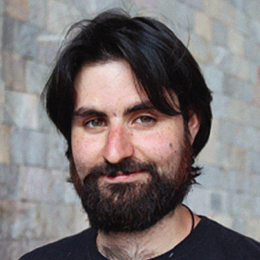Fellows Spotlight: Massimiliano Russo

Research focus: Developing new statistical tools to design and analyze complex data from biomedical studies.
MORE ABOUT MAX:
1. Can you describe your background and where you came from before this fellowship?
I started studying statistical science during my Bachelor at Università degli studi del Sannio, in my hometown, with a minor in actuarial sciences. Since the beginning, my interests lied in methodological and computational statistic. Hence, when I decided to attend a master at University of Padova (Italy), I changed my minor from actuarial sciences to computer science. During the two years of the master, I acquired an interest in data mining and complex real data problems that motivated me to continue my studies and enroll in a PhD program. Three years after I obtained my PhD in Statistics at the University of Padova, where I worked on Bayesian methods for tensor factorization models under the supervision Prof. Bruno Scarpa. During this period, I spent about one year and a half as a visiting research scholar at Duke University, working under the supervision of Prof. David B. Dunson.
2. Why did you choose to pursue this fellowship opportunity?
To me, the aim of a statistician is building methodology to solve real life problems, learning from the data. Following this principle, I tried to find real applications to motivate my research projects. In this, the CRS gave me the great opportunity to interact and collaborate with many experts in different fields providing real, impactful and interesting research questions.
3. What does your current research focus on, and who do you work with?
I mostly collaborate with Prof. Lorenzo Trippa at the Dana-Farber Cancer Institute (DFCI) in the Department of Data Science. Within his group, my research focuses on the design and analysis of biomedical studies to overcome pitfalls of standard data-analytic tools. For example, we recently developed two procedures to correct treatment effect estimates and to control type-I error rates, accounting for variations of patient population and treatment effects during trials. In fact, standard methods for the analysis of clinical trials assume that the patient population and treatment effects do not vary during the study; this is rarely the case when trials enroll patients over several years—as common in cancer trials. In these settings, if variations of patient characteristics remain unmodeled, results can be biased. We are also working on integrating multiple outcomes in the evaluation of drug efficacy. We aim to provide accurate evaluations with information from fewer patients compared to state-of-the-art methods.
4. What piqued your interest about regulatory science?
Regulatory science is a multi-disciplinary field that values collaborations and communication. Also, there is always the need of novel tools to create and analyze data to support regulatory decision-making. For me it is an ideal area where data analysis can help making the difference in day-to-day life.
5. What is your favorite thing about being part of the center?
I really appreciate the diversity of the people gravitating around the center. Here I had and have the opportunity to meet and collaborate with experts in broadly different fields. There is always something new to learn!
6. Can you describe a challenge you have faced and what you learned from it?
Research in regulatory science requires interdisciplinary interactions with experts in different fields such as medicine, law, and social science. Each field has different ways of thinking and presenting research as well as its own jargon. This motivated me to expand interests and study beyond my original expertise.
7. What are you doing next?
I am planning to carry on with my academic career as a faculty, trying to continue solving data-driven challenges.
8. Is there anything else you want to share?
I have several hobbies: hiking, reading, and playing music (bass guitar and double bass). During the pandemic I also started whittling wood, which I am really enjoying. If you have questions or want to chat about research, you can reach me at m_russo@hms.harvard.edu, or via twitter: @argMaxRusso.

